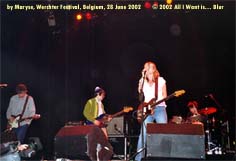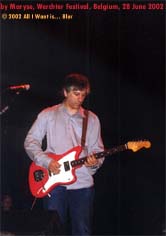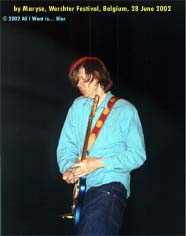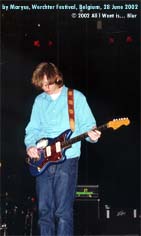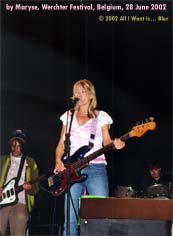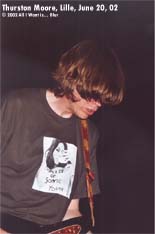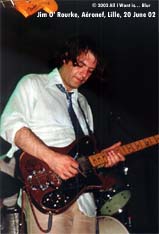SONIC YOUTH
Werchter Festival, Belgium, 28 June 2002
L'Aéronef, Lille, France, 20 June 2002
Vooruit, Gent, Belgium, 10 June 2001
Werchter Festival, Belgium, 28 June 2002
L'Aéronef, Lille, France, 20 June 2002
The concert
bull in the heather
cotton crown
Eric's trip
the empty page
plastic sun
kissability
making the nature scene
radical adults lick godhead style
--
disconnection notice
shadow of a doubt
kool thing
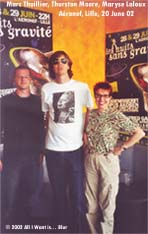
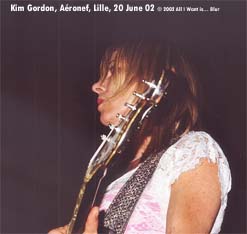
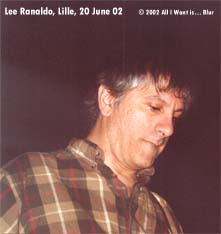
The pics cannot be used elsewhere without permission. Thank you.
Thurston Moore Interview
Interview conducted by Maryse Laloux & Marc Thuillier and transcribed by Maryse Laloux.
Maryse: Your 16th 'official' full-length release is named after your own self-built studio located on Murray Street. Can you tell us something about that studio and why you named the album after it?
Thurston: We built this studio inside this building on Murray Street maybe 5 or 6 years ago - 1995. It was a big studio. For us it was great because the real estate in NY is so expensive that to find a place like this that was cheap, it was good for us. It's down the Wall Street area. We just sort of took it for granted that's where we work. In fact it was annoying to get down there, I always had to take a train down there but I think after Sept. 11 we didn't think we would ever work there again because it's 2 blocks north of the World Trade Center which is where I used to take a train to and we thought it was destroyed and it wasn't. I mean it was shaken up but it wasn't destroyed. It was about 2 months before we could get back in. We had to stop recording for 2 months and we just stayed home. We had no idea what to do. One idea was maybe to go somewhere else, go to Memphis, Tennessee because there is a studio there we like. One idea was to see if maybe we could get back in there and see if everything works and we slowly were able to get back in there. Everything was blown out, all the electricity was gone, blown out. We had to bring in a 16-man team to detoxify the entire place. But it was approachable and all our tapes were there. The neighborhood was just completely destroyed. It was a very, very odd environment, very frightening, just desolate and everybody was gone except for the policemen and some firemen and many trucks just fixing and carrying and all that. But we were able to get the studio running again and we decided to record the record there. I think it's because we felt the desire to reclaim our neighborhood to some degree and do this work there which we thought was creative in the face of this destruction.
Maryse: So you chose to name the album after Sept. 11?
Thurston: No. We had no desire to talk about Sept 11. It's too much of an exploitation. The only reason we called it "Murray Street" is because I was walking around taking pictures of the neighborhood. One picture I took was of a street sign. It's on the back cover of the record and I brought it into the studio and everybody was like "that should be the cover" and then we thought "no, this is too weird" but we liked it enough to put it on the back cover and the front cover is more of a utopian image of two children picking strawberries under a net.
Maryse: Who are those two girls?
Thurston: My daughter, Coco, and a friend of hers from Holland. So we called it "Murray Street" because ... well the sign said Murray Street...
Maryse: Is it part of a trilogy on NYC?
Thurston: Well that's what they say, what the biographer says. I think it's the writer coming up with this idea. It's not a bad idea. Why not? A trilogy... I like trilogies. So we need a third idea and maybe it's the future. I guess we can sing about the future.
Maryse: So now about this vinyl and the French. You scored music for Olivier Assayas....
Thurston: Demonlover. I think this music (the first two tracks of the vinyl) comes from this. I'm not sure whether this music comes from that film or not. I don't know if it does.
Marc: Lee said it comes from Demonlover and Behind the Sun...
Thurston: It's just some loose tapes. It's from the same session. The titles come from this French artist named Claude Pelieu. Claude Pelieu was a man who was a very close friend of William Burroughs' in Paris and he lived with William Burroughs and Brion Gysin in the Beat Hotel in Paris on rue Git le Coeur I think. He was great. Claude Pelieu wrote some books in the 60s and 70s. He had a book of collections of his writings called "Kali Yug Express" which I took this title from and these are some titles of his: "Dernière minute Electrifée" ("the final electrified minute"), "Le Paysage Zim Zum", "Coca Neon Kamera Sutra". He was a really interesting writer. He was responsible along with Burroughs and Gysin for doing cut-up techniques and "experimental writing" but nobody talks about Pelieu and he was very important to this whole experimental literature scene. He was a Frenchman. He lives near me now in Massachusetts and he is married to Mary Beach. Her mother was the one who started Shakespeare & Company. So it's an important scene. Claude Pelieu is remarkable. He also did collage art. He is a great sort of underground French artist and so these titles come from Claude Pelieu.
Maryse: So you scored music for Olivier Assayas and you recorded with Brigitte Fontaine and now the French have just been privileged to receive this superb 10" record. Besides, I've read that your daughter was named Coco because it is a French name. So should we understand that you have some special attachment to the French?
Thurston: Are we Francophiles? I don't know. Maybe it's because I always admired the way the French cultural society embraced American expatriate musicians who were doing very radical music and they were not accepted in their hometown like Albert Ayler and free jazz musicians... It has always impressed me quite a bit and I think a lot of more challenging streams of music and art that come out of different areas are recognized in France for the value that they may have and so maybe that is something I respond to. But I don't think it's for any reason. I just think maybe there is a connection, some cultural stimulus that's French.
Maryse: Now I have a question about your audience. I attended your 'SYR4-Goodbye 20th century' performance in Belgium last year. The audience reception you got there was wonderfully warm and respectful. I heard that parts of the concert were booed in Paris and London. So does the audience differ very much from one country to another? Where do you get the best and most loyal reception?
Thurston: That was a very interesting tour because we were playing music primarily by 20th-century academic composers like John Cage and Cornelius Cardew and Yoko Ono. A lot of it had to do with the presentation. In Belgium it was very obvious that this was Sonic Youth presenting music of this sort and it wasn't going to be a Sonic Youth concert. It was in a theatre that sort of presented this music historically.
Maryse: And Coco played the piano.
Thurston: In Paris - it was at the Olympia I think? - and so in a way we've played the Olympia before, we've had these rock concerts there and I just think a lot of people came disregarding the fact that maybe we were doing something really outside of what is predicted and so there was enough people there to sing "let's hear 'Teenage Riot' please" so the information maybe wasn't so apparent and so therefore there was a lot of people who didn't want to hear this music so... We realized that was going to happen.
London, I've never had success in London presenting anything outside of what's expected which is strange because we always deliver something that's unexpected. Usually in countries we always ask for opening bands to be bands that come from a real radical underground, that present music that's really challenging for the most part. Last night in Lyon we had Jean-François Pauvros. He's in a new group called Marteau Rouge. Any other improvisational band that's kind of wild. It's not something people normally see in these venues or with bands like us and it's great because every time we do this all over the world people love it. For the most part they are just like "Wow! That's something I've never seen or heard before". In London they hate it. They do they are just like they don't get it. They just say "Why? This is crap!". They are very factionalized in London. It has to be one thing and they can't mix, there's no mixing. I don't know why?
Maryse: So are there places where you are particularly popular? Would you say that you are more popular in Europe than in the States for instance?
Thurston: Maybe we are more exotic here! No I think it's about the same. I mean there are just some hotbeds like Tokyo. I know we are like less popular maybe like in Germany and a couple of others. It's always changing a little bit through the years so...
Maryse: Three years ago you had all your equipment stolen and last year your studio found itself in the middle of a ravaged and barricaded area. The saying goes that 'every cloud has a silver lining'. Do you agree?
Thurston: Well... yeah... I mean we've always sort of been very hopeful in the light of anything and everything like this.
Maryse: Did these two experiences have any silver lining?
Thurston: Well certainly getting the guitars stolen and everything, to me it was almost like being a new band. I just had to pick up new guitars and try new things and that was very rewarding in some way and it was a break-away from this thing that we became so comfortable with and I liked that and it was rewarding in a way... I was glad to see everything thrown away. Er.. I don't really see anything special coming out Sept. 11 really at all. I think it's remarkable to be alive and to experience such a critical piece of history and to have such close proximity to it. I know it's something I'll never forget even if it's so horrific. I feel amazed that I'm actually sort of existing around this. I just cannot wrap my mind around it it's just so crazy for me but I don't really see anything positive coming out of it except for the response that comes out of it. I think as far as the community exists, the community of people who all over the world who sort of have only a desire for understanding and peace. I think it brings them close together. In America it's very interesting because the country is so split in half and I don't think there is any real mainstream recognition of the fact that a solid half of America is not really in compliance with what's going on with the Administration and what their connection to all this history of animosity is about and so it's not all "Rah! rah! rah! USA!!!" but that's what you see always on the news. And I think it's gonna be a sort of civil war in America, at least philosophically there will be always... this breakdown... so I'm curious to see how it develops.
Maryse: How do you decide which material is going to be released on your own Sonic Youth Records label and what is going to be released on the Geffen label?
Thurston: We would never give Geffen records that we do on SYR because Geffen is all about making large campaigns and spending money and trying to increase the sales of their product. They have no interest in doing anything on a modest scale and just releasing something that's just for pretty much fans of our music.
Marc: That's why you've got Ecstatic Peace as well.
Thurston: That's why we do different things outside of Geffen yeah because I don't want to have to think that every piece of music that we construct has to be so precious that it needs this big campaign so we decided to make SYR so we can actually release records without having to do such a sales pitch on everything. It's just there. It's not necessary. It's not in Geffen's best interest. They don't want to have to deal with music that can't get near the radio and with our SYR records there's very few radio stations that will attempt to play this music but there is a whole culture, people who record music of this nature. We are very much part of that but we also like doing really song-based albums so it's great we can have a label that will do it...
Maryse: So you mean that you'll keep on releasing stuff for Geffen, won't you?
Thurston: Yeah unless they tell us to take a hike. You know, they just may!
Marc: Did you ever see the Inside the Actors Studio Bravo TV show? At the end there is
a Bernard Pivot questionnaire. Do you know it?
Thurston: No
Marc: I want to do it.
Thurston: Ha! ha!...but you can do it anyway.
Marc: What is your favorite word?
Thurston: My favorite word is... Alabama. (laughs)
Marc: What is your least favorite word?
Thurston: My least favorite word is "bush". (laughs)
Marc: What turns you on?
Thurston: What turns me on is I think ... the Runaways. (laughs)
Marc: What turns you off?
Thurston: What turns me off is Bush, the band. (laughs)
Marc: What sound do you love?
Thurston: The sound of Pat Smear's guitar on the "GI" album by the Germs.
Marc: What sound do you hate?
Thurston: I hate the sound of the high-pitched squeal of car breaks in London on all the streets, that piercing squealing noise.
Marc: What is your favorite curse word?
Thurston: My favorite curse word is 'fuck a duck'. (laughs)
Marc: What profession other than yours would you like to attempt?
Thurston: I always wanted to be an ice sculptor, sculpting ice sculptures.
Marc: What profession would you not like to participate in?
Thurston: What profession I would never want to do? I think maybe it would be... Oh, I know, it's scraping gum off the floors of the Metro. (laughs)
Marc: If heaven exists, what would you like to hear God say when you arrive at the Pearly Gates?
Thurston: I would like to hear the sound of an espresso machine making me like the best espresso. (laughs)
Maryse: Do you have any plans to collaborate with Graham Coxon and Damon Albarn from Blur again?
Thurston: No, I don't think so. I don't really know them very well. I knew Graham a little bit. He was the one who asked me to do the Essex Dogs remix but I'm not a fan, I'm not really a big fan. I think they are OK. I shouldn't say that. It's really not my cup of tea but I enjoyed doing that record.
Vooruit, Gent, Belgium, 10 June 2001
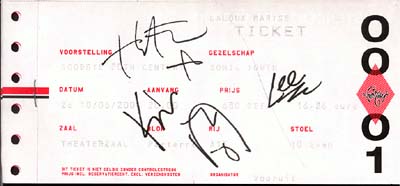
I went to a Sonic Youth experimental performance last night and it was absolutely amazing. They performed tracks from "SYR4-Goodbye 20th century" which is a collection of their own interpretations of the works of avant-garde composers.
The venue was Vooruit in Gent, Belgium, an incredibly beautiful theater with excellent acoustics.
Before they began the show Thurston Moore ambled along on stage for a while and the audience remained amazingly quiet. Not a scream, not a cheer was heard. He asked us if we would mind hearing his daughter play a little piano before they began their performance. He stood by the 6-year-old cutie while she played a baby tune. Charming !
They started with James Tenney's "Having never Written a note for Percussion", a haunting crescendo of noises that threatened to make our ears bleed followed with a decrescendo of free-form spooky sounds. Then came John Cage's pieces ("Six" and "Four6") performed as a double quartet, Yoko Ono's screams, Cornelius Cardew's "Treatise", just to name a few. Their George Maciunas' "Piano Piece#13" was almost hilarious as they took turns to nail the keys of an old piano with 15cm-long carpenter nails...
The pieces were mostly provocative avant-garde noise-rock. Fascinating, to say the least. As to the audience we were like devotees captivated by our gods. Not a whisper could be heard until a second or two after each song. Wonderful!
Oh, I'm still so much into that show that I was about to forget to tell you about my little chat with Thurston Moore. I asked him to tell me about his remix of "Essex Dogs". He said Blur sent him the tape and he did some cutting into it, there was no collaboration work really. I told him that he is one of Graham Coxon's guitar heroes. He said he likes what Graham does too, that he hasn't seen him for 2 years now but he's never worked with him. I told him Graham was going to release his 3rd solo album this summer and finished our little chat by saying that Blur and Sonic Youth are two of my favorite bands to which he kindly replied "that's nice" with an amiable grin. Thurston was very friendly and cool. I guess I could have asked more questions because he seemed to be happy to chat and I was the only one to be standing there in a corridor between the dining-room and the artists' dressing-rooms but I didn't want to take too much of his time. I greeted Lee Ranaldo as well and asked him if they ever got back the equipment (customized guitars, drum kits, amplifiers, synths and all) that was stolen 2 years ago and he said sadly they never did. I also greeted Kim but she isn't a talker at all so I didn't bother her.
[Back to Home]
